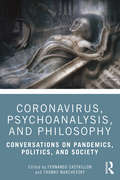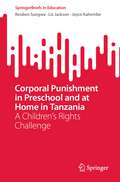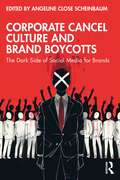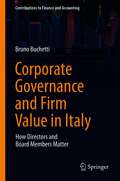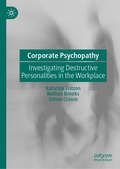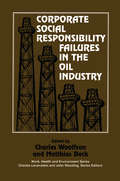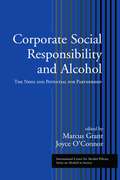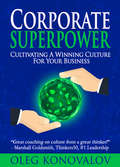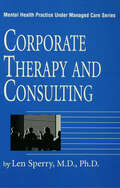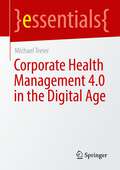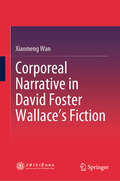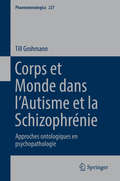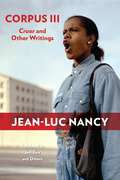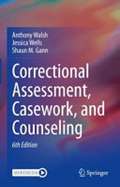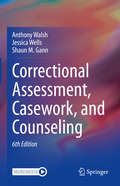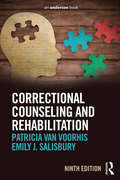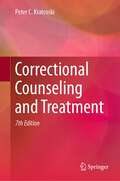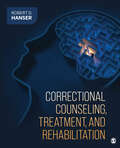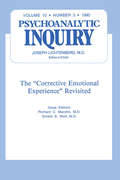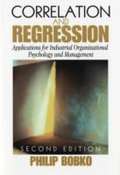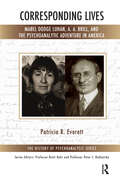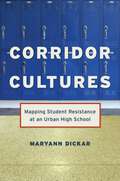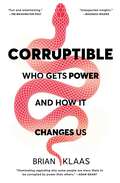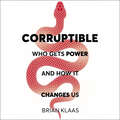- Table View
- List View
Coronavirus, Psychoanalysis, and Philosophy: Conversations on Pandemics, Politics and Society
by Fernando Castrillón Thomas MarchevskyOriginally published in the European Journal of Psychoanalysis (EJP), the essays in this volume are a set of responses to the coronavirus crisis by distinguished philosophers and psychoanalysts from around the globe. The coronavirus irrupted making swift and deep cuts in the fabric of our existence: the risks of contagion and indefinite periods of isolation have radically altered the functioning of society. Pandemics do not wait for comprehension in order to proliferate. Confusion, sickness, and death punctuate the failure of governments worldwide to respond. This collection of writings examines the effects of the pandemic and the conditions that make possible such a global crisis. The writers provoke us to consider how capitalism, governmental power, and biopolitics mold the contours of life and death. The contributors in this collection ignite urgent political dialogue, address emergent transformations in the social field and offer perspectives on shifts in subjectivity and psychoanalytic practice. Beyond providing reflections on the impact of the coronavirus, the authors point to determinants of how the crisis will unfold and what may be on the horizon. This book will be invaluable to psychoanalysts, psychotherapists, philosophers, and to all those interested in the implications of the virus for psychoanalytic practice and theory, and the social, cultural and political spheres of our world.
Corporal Punishment in Preschool and at Home in Tanzania: A Children’s Rights Challenge (SpringerBriefs in Education)
by Liz Jackson Joyce Kahembe Reuben SungwaThis book examines educators and parents’ practices of corporal punishment of preschool-aged children in school and at home in Tanzania, considering why it is that many children in Tanzania are still subject to corporal punishment. It explores the attitudes of parents, teachers, and educational leaders about corporal punishment, in the context of existing government policies, laws, and regulations, using interviews, questionnaires and observation. Corporal punishment is widely and frequently used by both parents and teachers as a way of maintaining discipline, with most regarding it favourably as a means of behavioural modification. Furthermore, the book shows that the use of corporal punishment in Tanzania is influenced by cultural norms and religious beliefs, teacher qualifications and parents’ levels of education, past experiences of corporal punishment, and related beliefs about the practice. Crucially, there has not yet been a societal-level legal framework established to protect children from the harms involved.
Corporate Cancel Culture and Brand Boycotts: The Dark Side of Social Media for Brands
by Angeline Close ScheinbaumThis topical book examines and tests the complexities of unintended consequences of social media that often impact brands and companies from both an economic and a reputational lens. This book introduces the term “corporate cancel culture,” highlighting the growing trend among customers to leverage social media to communicate their grievances with companies. This book reports challenges of social media platforms to brands and companies. The challenges addressed entail including social media trolls, the power of influencers, the dark web, cancel culture in sports due to political constraints, social media influencer livestreams, and misinformation. Written by a team of experts from North America, Europe, South America, and Asia, this book showcases real‑world expertise in marketing, branding, consumer psychology, economics, and communication. This book also considers solutions for brands and companies who need to address the dark side of social media by offering insights on fostering accountability among brands and business leaders and providing a roadmap to mitigate consumer resistance.Corporate Cancel Culture and Brand Boycotts: The Dark Side of Social Media for Brands is a must read for students of psychology, marketing, public relations, management, and social media. It will also be of interest to users of social media – both consumers and business/organizations. It is especially valuable for marketing/advertising professionals, social media professionals/influencers, and business executives. It is designed to be read alongside The Dark Side of Social Media: A Consumer Psychology Perspective.
Corporate Governance and Firm Value in Italy: How Directors and Board Members Matter (Contributions to Finance and Accounting)
by Bruno BuchettiThis book expands on the literature on the characteristics of management boards by especially focusing on family-listed and family-controlled companies, as they are ideal for studying board heterogeneity. It uses specific multidimensional indices and in-depth econometric analysis to introduce new variables, such as international experience, that represent a source of competitive advantage for firms in today’s globalized world. In addition, by examining the heterogeneity ratio and the representation of independent and family directors, the book demonstrates how family-controlled firms use independent directors to import their heterogeneous expertise. The book makes a threefold contribution: for regulators, it offers suggestions on improving the quality of reporting in family-controlled firms; for researchers, it demonstrates the importance of including directors’ characteristics apart from the firm-specific factors in their analyses; and for practitioners, it shows that selecting directors with specific characteristics can have a substantial impact on firms’ performance.
Corporate Psychopathy: Investigating Destructive Personalities in the Workplace
by Katarina Fritzon Nathan Brooks Simon CroomThis book analyses the conceptualization of psychopathic personality disorder for criminal/forensic populations and examines in depth the emerging phenomenon of the ‘corporate psychopath’. In doing so its authors expose the paradoxical nature of the disorder: while it is frequently associated with antisocial, criminal and predatory behaviour, more recent studies have highlighted examples of creative, visionary and inspiring leaders who are also found to present a high degree of psychopathy. They focus on the nature, behaviours and consequences of psychopathy in executives and across the organization, offering an important contribution to the emerging body of research on psychopathy and other problematic personality constructs in the workplace. The book will appeal to scholars, students and professionals across the discipline, and particularly to those working in workplace, forensic and personality psychology.
Corporate Social Responsibility Failures in the Oil Industry
by Charles Woolfson and Matthias BeckCorporate Social Responsibility Failures in the Oil Industry directly challenges the oil industry's claims of corporate good citizenship, now widely advanced as part of a global public relations initiative. The volume spans the industry's reach, from the troubled waters of the UK offshore Continental Shelf, with its horrendous legacy of the Piper Alpha oil rig disaster, to the inhospitable shores of Newfoundland with its own tragic legacy of lost lives; to the new frontier of oil corporate colonialism in the former Soviet Union and the icy plains of Alaska. The central theme of violations of basic labour rights and of health and environmental protection standards will make uncomfortable reading in the boardroom. It is equally essential reading for those who seek to improve the position of workers and industries within the oil industry's global reach.
Corporate Social Responsibility and Alcohol: The Need and Potential for Partnership (ICAP Series on Alcohol in Society)
by Marcus Grant Joyce O'ConnorIncreased scrutiny on the part of the general public, media, and government has warranted a reexamination of corporate responsibilities, standards of accountability, the company's role in its local and extended community, and its ethical position in our society and culture. Corporate Social Responsibility and Alcohol considers the basic values, ethics, policies and practices of a company's business. Particular attention will be paid to the alcohol beverage industry, and the many unique issues that are specific to this business, such as: responsible marketing, promotional, and advertising campaigns and strategies; the particular risks inherent in any alcoholic product; issues of abuse prevention & education; research; and legal and ethical aspects of alcohol. This will be the seventh volume in the ICAP Series on Alcohol in Society.
Corporate Superpower: Cultivating A Winning Culture For Your Business
by Oleg KonovalovWinner of the Readers&’ Favorite® silver medal! &“Can help your organization create the culture needed to move to the next level of success.&”—Marshall Goldsmith, Thinkers50, #1 Leadership Thinker, #1 Executive Coach in the World Culture is the soul of any organization, whether a gas station, church or international corporate powerhouse. A strong culture breeds loyalty, innovation, and success. A weak culture will breed cynicism, apathy, instability, and the eventual demise of the organization. Yet, culture is an often-overlooked aspect of business thinking and strategy. Positive culture can&’t be maintained without such critical factors as respect, job satisfaction, involvement, loyalty, shared affection, preparedness to change, and responsibility, which defines the engagement of everyone in an organization. Teamwork, innovativeness, professionalism, accountability, shared vision, and trust form the main asset of any organization, its metaphysical resources. They define the nature of psychological power residing in culture and have direct impact on a company&’s performance and achievement of its goals. Whether or not this potential is realized depends on how effectively it is exploited. In this book, a reader will learn what culture is, why it is important and how to fix it when it goes wrong. Leaders, management, as well as employees on the front lines will benefit from the discussion. This book is for those rising above the ordinary every day. &“This book is among the most comprehensive, insightful and educational books I have ever read on how to build a world-class culture. This a must read on this extremely critical topic.&”—John Spence, Top 100 Business Thought Leader & Small Business Influencer in the USA
Corporate Therapy And Consulting (Brunner/mazel Mental Health Practice Under Managed Care Ser. #Vol. 5)
by Len SperryPublished in 1996, Corporate Therapy and Consulting is a valubale contribution to the field of Psychotherapy.
CorporateHealthManagement4.0inthedigitalage (essentials)
by Michael TreierThe essentials discusses the possibilities of digital occupational health management (D-BGM), from health communication such as health portals to wearables and health apps to online coaching, with regard to the requirements of Work 4.0. The reader receives information on the integration of digital components in the health management portfolio and an argumentation sketch with regard to the benefits of digitalization for increasing the effectiveness of health management measures in a modern working world. Corresponding success factors are elaborated and the potentials and risks of D-BGM are identified.
Corporeal Narrative in David Foster Wallace’s Fiction
by Xiaomeng WanThis book serves as a critical examination of contemporary American literature by examining David Foster Wallace's incorporation of corporeal narrative techniques in his novels, with a particular focus on The Broom of the System, Infinite Jest, and The Pale King. By employing corporeal narratology as a conceptual framework, it sheds light on Wallace's profound exploration of the human body and its societal implications. Through detailed analysis, the book reveals how Wallace's narratives serve as a critique of contemporary issues such as self-alienation, consumerism, and the dehumanizing effects of modern society. Designed for scholars and students of literature, cultural studies, and narrative theory, this book provides a comprehensive understanding of Wallace's literary legacy and his keen observations on the complexities of human existence in the modern world.
Corps et Monde dans l’Autisme et la Schizophrénie: Approches ontologiques en psychopathologie (Phaenomenologica #227)
by Till GrohmannLe livre offre une investigation phénoménologique des traits caractéristiques des troubles du spectre de l'autisme et de la schizophrénie. Son matériel de base sont des écrits autobiographiques ainsi que des descriptions de patients en première personne. L’objectif principal de cette investigation est double: premièrement, de systématiquement élaborer la corrélation fondamentale entre le corps et le monde; deuxièmement, de comprendre autisme et schizophrénie comme des transformations typiques de cette corrélation. L’auteur interroge schizophrénie et autisme comme des transformations comparables, mais néanmoins fondamentalement distinctes, de la structure ambivalente du corps propre. Il combine une lecture de philosophie phénoménologique avec des approches provenant de la psychiatrie et de la psychopathologie. L’analyse phénoménologique de la corporéité amène l’auteur à analyser une double structure expérientielle, faite de vécus subjectifs et objectifs du corps. En référence à ce paradigme, autisme et schizophrénie apparaissent comme des possibles destins de la structure ambivalente du corps. Un rôle majeur est ici attribué à la spatialisation, c’est-à-dire aux différents modes de vivre et de représenter l’espace.
Corpus III: Cruor and Other Writings
by Jean-Luc NancyA beautiful, profound series of reflections on the body by one of the most prominent and consequential philosophers of continental EuropeThis landmark volume brings into English Jean-Luc Nancy’s last completed work and concludes his remarkable philosophical reflections on the body, a project he began almost thirty years ago. Taking the body as an intersection of pulsing life and destructive cruelty on a global scale, Nancy’s account becomes more vivid, more physical, than ever, even as it ventures into language that is as lyrical as it is profound. This vividness is manifest in blood: as it flows, in all its pulsing and forceful circulation, and as it spills, in the cruelty of existences confronted daily by countless destructions. This can be described as sanguis and cruor, the two Latin words for blood’s intermingled but distinct aspects. This distinction allows Nancy to highlight an almost mystical sense of the body (yet one that remains soberly on this side of its manifest insistence), alongside the cruelty that pervades our world—a world whose very existence is threatened by its reduction to mere objects.The exceptional writings brought together in Corpus III comprise a masterful work of philosophy that marries rigorous erudition—on Freud, Nietzsche, and others—with rich poetic language and an actual poem. Nancy’s thought opens the body onto its own unaccountable origins, its plural singularities, its enmeshed instantiations, and its excessive irreducibles, which are also the elusive excesses of language. Whereas in earlier texts Nancy has referred to this excess as poetry, here he performs it in the form of a poem, in the extraordinary hymn entitled Stoma. While the publication of a poem by Nancy is a notable event, equally noteworthy is a remarkable essay entitled “Scandalous Death,” in which Nancy meditated on a subject that was to come to him too soon after. Above all, the book is crucial for bringing into English Cruor, the very last book Nancy completed before his death, an evocative meditation offered by a great thinker on the complex conditions of his own—and our—singular survival.
Correctional Assessment, Casework, And Counseling
by Anthony Walsh Jessica Wells Shaun M. GannThis book combines the latest in sociology, psychology, and biology to present evidence-based research on what works in community and institutional corrections. It spans from the theoretical underpinning of correctional counseling to concrete examples and tools necessary for professionals in the field. <p><p> This book equips readers with the ability to understand what we should do, why we should do it, and tools for how to do it in the field. It discusses interviewing, interrogating, and theories of directive and nondirective counseling, including group counseling. It discusses the strengths and weaknesses of various correctional approaches such as cognitive-behavioral therapies, group counseling, and therapeutic communities. It introduces ethical and legal considerations for correctional professionals. <p> With an explanation of the presentence investigation report, case management, and appendices containing a variety of classification and assessment instruments, this volume provides practical, hands-on experience. Students of criminal justice, psychology and social work will gain an understanding of the unique challenges to correctional success and practical applications of their studies.
Correctional Assessment, Casework, and Counseling
by Anthony Walsh Jessica Wells Shaun M. GannThis book combines the latest in sociology, psychology, and biology to present evidence-based research on what works in community and institutional corrections. It spans from the theoretical underpinning of correctional counseling to concrete examples and tools necessary for professionals in the field. This book equips readers with the ability to understand what we should do, why we should do it, and tools for how to do it in the field. It discusses interviewing, interrogating, and theories of directive and nondirective counseling, including group counseling. It discusses the strengths and weaknesses of various correctional approaches such as cognitive-behavioral therapies, group counseling, and therapeutic communities. It introduces ethical and legal considerations for correctional professionals. With an explanation of the presentence investigation report, case management, and appendices containing a variety of classification and assessment instruments, this volume provides practical, hands-on experience. Students of criminal justice, psychology and social work will gain an understanding of the unique challenges to correctional success and practical applications of their studies. "This book is a teacher/student/practitioner's dream. Grounded in theory and evidence-based research on best practices, it is accessible, well-written, filled with sound insights and tools for working with criminal justice clients. I have used and loved each new edition of this fine text." — Dorothy S. McClellan, Texas A&M University-Corpus Christi
Correctional Counseling and Rehabilitation (Ninth Edition)
by Patricia Van Voorhis Emily J. Salisbury<p>Correctional Counseling and Rehabilitation, 9th ed., presents foundations of correctional intervention, including overviews of the major systems of therapeutic intervention, diagnosis of mental illness, and correctional assessment and classification. Now fully updated to reflect DSM-5, its detailed descriptions and cross-approach comparisons help students prepare for a career in correctional counseling and allow working professionals to better determine which techniques might be most useful in their particular setting. <p>The content is divided into five parts: (1) A Professional Framework for Correctional Counseling; (2) Understanding the Special Challenges Faced by the Correctional Counselor in the Prison Setting; (3) Offender Assessment, Diagnosis, and Classification; (4) Contemporary Approaches to Correctional Counseling and Treatment, (5) Interventions for Special Populations, and (6) Putting It All Together. The book is appropriate for upper-level undergraduates and graduate students in Criminal Justice and Criminology, Psychology, and Social Work programs as well as correctional counseling practitioners.</p>
Correctional Counseling and Treatment
by Peter C. KratcoskiThis book provides a comprehensive overview of the effective methods used in the criminal justice system in the United States to counsel and treat offenders. This new edition outlines innovative approaches to counselling and treatment that focus on recent developments that present new challenges to those practitioners engaged in counselling and treating of criminal and delinquent offenders.The volume is broken down into three sections:Correctional Counseling and Treatment: Past and PresentThe Diverse Roles of Counselors in Correctional TreatmentTreatment Methods Used in CorrectionsIn each section, the chapters address the role of legislation on the corrections process and how it impacts diverse populations of correctional facilities, including juvenile offenders; those with mental illness, addiction and substance abuse problems, or physical and mental disabilities; and homeless populations. Featuring interviews with correctional practitioners, discussion questions, case studies, and application tools, this volume is ideal for advanced undergraduate and early graduate-level students taking for courses in correctional treatment, correctional rehabilitation, or community corrections.
Correctional Counseling, Treatment, and Rehabilitation
by Robert D. HanserWritten for the undergraduate and graduate future practitioner, Correctional Counseling, Treatment, and Rehabilitation will provide an overview of how counseling exists within the correctional environment, both in institutional settings and community-based settings. Author Robert D. Hanser, recognized for both scholarship and practice in correctional mental health treatment, uniquely positions this text to offer a real-world, practitioner focused approach to the topic. Correctional Counseling, Treatment, and Rehabilitation approaches the reader with the presumption that there is a basic understanding of issues in corrections, however there is not any true exposure to offender treatment. Explaining the techniques and processes that are utilized in the actual treatment process, this text will equip all future correctional practitioners with an understanding of basic concepts within correctional counseling and treatment that are up-to-date and relevant to the world of practitioners. With a hands-on approach, this new text will guide students through how to apply this material throughout.
Correctional Counseling, Treatment, and Rehabilitation
by Robert D. HanserWritten for the undergraduate and graduate future practitioner, Correctional Counseling, Treatment, and Rehabilitation will provide an overview of how counseling exists within the correctional environment, both in institutional settings and community-based settings. Author Robert D. Hanser, recognized for both scholarship and practice in correctional mental health treatment, uniquely positions this text to offer a real-world, practitioner focused approach to the topic. Correctional Counseling, Treatment, and Rehabilitation approaches the reader with the presumption that there is a basic understanding of issues in corrections, however there is not any true exposure to offender treatment. Explaining the techniques and processes that are utilized in the actual treatment process, this text will equip all future correctional practitioners with an understanding of basic concepts within correctional counseling and treatment that are up-to-date and relevant to the world of practitioners. With a hands-on approach, this new text will guide students through how to apply this material throughout.
Corrective: Psychoanalytic Inquiry, 10.3
by Richadd C. Marohn Ernest S. WolfFirst published in 1994. Routledge is an imprint of Taylor & Francis, an informa company.
Correlation and Regression: Applications For Industrial Organizational Psychology and Management (Second Edition)
by Philip Bobko"This book provides one of the clearest treatments of correlations and regression of any statistics book I have seen. . . . Bobko has achieved his objective of making the topics of correlation and regression accessible to students. . . . For someone looking for a very clearly written treatment of applied correlation and regression, this book would be an excellent choice. " --Paul E. Spector, University of South Florida "As a quantitative methods instructor, I have reviewed and used many statistical textbooks. This textbook and approach is one of the very best when it comes to user-friendliness, approachability, clarity, and practical utility. " --Steven G. Rogelberg, Bowling Green State University
Corresponding Lives: Mabel Dodge Luhan, A. A. Brill, and the Psychoanalytic Adventure in America (The History of Psychoanalysis Series)
by Patricia R. EverettAn influential New York salon host and perpetual seeker of meaning, Mabel Dodge entered psychoanalysis in 1916 with A.A. Brill, the first American psychoanalyst, continuing until she moved to New Mexico in December 1917. In Taos, she met Antonio Luhan, the Pueblo Indian who became her fourth husband in 1923, a radical union that forever altered her turbulent life. From the beginning of her analysis until 1944, Mabel wrote to Brill and he replied, yielding 122 letters. No other such extensive, elaborate written conversations exist between patient and analyst. This book presents a narrative organized around these letters, featuring the turmoil in Mabel's relationships with others, most notably D. H. Lawrence, as well as her extraordinarily candid memoirs, both published and unpublished, inspired by Brill's fierce insistence upon constructive outlets. In her correspondence, as in life, Mabel was despairing, insightful, insecure, and talented, reporting to Brill her emotional states, seeking his advice. With warmth and frankness, he offered opinions, affection, and interpretations.
Corridor Cultures: Mapping Student Resistance at an Urban School (Qualitative Studies in Psychology #15)
by Maryann DickarFor many students, the classroom is not the central focus of school. The school's corridors and doorways are areas largely given over to student control, and it is here that they negotiate their cultural identities and status among their peer groups. The flavor of this “corridor culture” tends to reflect the values and culture of the surrounding community.Based on participant observation in a racially segregated high school in New York City, Corridor Cultures examines the ways in which school spaces are culturally produced, offering insight into how urban students engage their schooling. Focusing on the tension between the student-dominated halls and the teacher-dominated classrooms and drawing on insights from critical geographers and anthropology, it provides new perspectives on the complex relationships between Black students and schools to better explain the persistence of urban school failure and to imagine ways of resolving the contradictions that undermine the educational prospects of too many of the nations' children.Dickar explores competing discourses about who students are, what the purpose of schooling should be, and what knowledge is valuable as they become spatialized in daily school life. This spatial analysis calls attention to the contradictions inherent in official school discourses and those generated by students and teachers more locally.By examining the form and substance of student/school engagement, Corridor Cultures argues for a more nuanced and broader framework that reads multiple forms of resistance and recognizes the ways students themselves are conflicted about schooling.
Corruptible: Who Gets Power and How It Changes Us
by Brian KlaasAn &“absorbing, provocative, and far-reaching&” (Kirkus Reviews, starred review) look at what power is, who gets it, and what happens when they do, based on over 500 interviews with those who (temporarily, at least) have had the upper hand—from the creator of the Power Corrupts podcast and Washington Post columnist Brian Klaas.Does power corrupt, or are corrupt people drawn to power? Are tyrants made or born? Are entrepreneurs who embezzle and cops who kill the result of poorly designed systems or are they just bad people? If you were suddenly thrust into a position of power, would you be able to resist the temptation to line your pockets or seek revenge against your enemies? To answer these questions, Corruptible draws on over 500 interviews with some of the world&’s top leaders—from the noblest to the dirtiest—including presidents and philanthropists as well as rebels, cultists, and dictators. Some of the fascinating insights include: how facial appearance determines who we pick as leaders, why narcissists make more money, why some people don&’t want power at all and others are drawn to it out of a psychopathic impulse, and why being the &“beta&” (second in command) may actually be the optimal place for health and well-being. Corruptible also features a wealth of counterintuitive examples from history and social science: you&’ll meet the worst bioterrorist in American history, hit the slopes with a ski instructor who once ruled Iraq, and learn why the inability of chimpanzees to play baseball is central to the development of human hierarchies. Based on deep, unprecedented research from around the world, and filled with &“unexpected insights…the most important lesson of Corruptible is that when psychopaths inadvertently reveal their true selves, the institutions that they plague must take action that is swift, brutal, and merciless&” (Business Insider).
Corruptible: Who Gets Power and How it Changes Us
by Dr Brian KlaasDoes power corrupt, or are corrupt people drawn to power? Are entrepreneurs who embezzle and cops who kill the outgrowths of bad systems or are they just bad people? Are tyrants made or born? If you were thrust into a position of power, would new temptations to line your pockets or torture your enemies gnaw away at you until you gave in?To answer these questions, Corruptible draws on over 500 interviews with some of the world's noblest and dirtiest leaders, from presidents and philanthropists to rebels, cultists, and dictators. It also makes use of a wealth of counter-intuitive examples from history and social science: You'll meet the worst bioterrorist in American history, hit the slopes with a ski instructor who once ruled Iraq, have breakfast with the yogurt kingpin of Madagascar, learn what bees and wasps can teach us about corruption, find out why our Stone Age brains cause us to choose bad leaders, and learn why the inability of chimpanzees to play baseball is central to the development of human hierarchies.Corruptible will make you challenge basic assumptions about how you can rise to become a leader and what might happen to your head when you get there. It also provides a roadmap to avoiding classic temptations, suggesting a series of reforms that would ensure that better people get into power, while ensuring that power purifies rather than corrupts.'ILLUMINATING' - Adam Grant, bestselling author of Think Again 'PASSIONATE, INSIGHTFUL, AND OCCASIONLLY JAW-DROPPING' - Peter Frankopan, bestselling author of The Silk Roads(P) 2021 Hodder & Stoughton Limited
